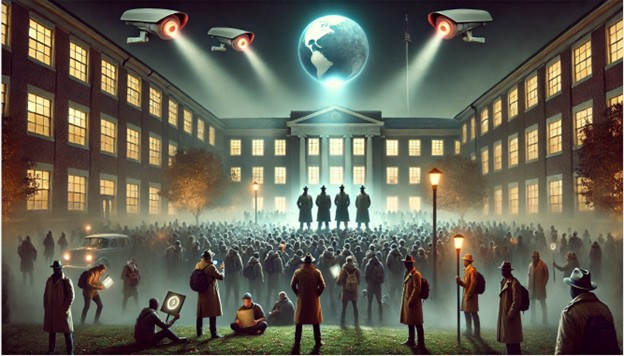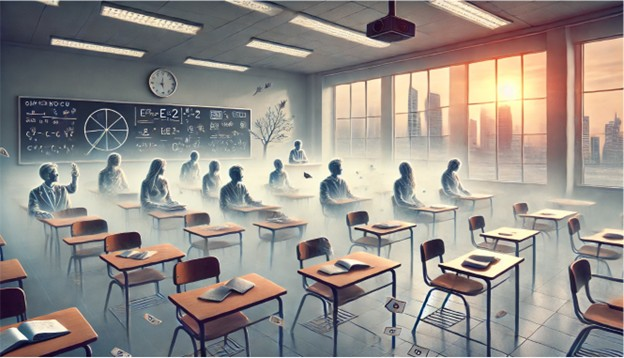Deported for Dissent: The Trump Administration’s Crackdown on Pro-Palestinian Campus Activism
Input
Modified
The New Targets: Activists, Scholars, and Students Censorship by Deportation Surveillance, Silence, and the Future of Academic Freedom

The New Targets: Activists, Scholars, and Students
In early March 2025, Mahmoud Khalil, a graduate of Columbia University’s School of International and Public Affairs, stepped out into the cold New York morning unaware that it might be his last day of freedom in the United States. By nightfall, Khalil—a lawful U.S. permanent resident known on campus for his outspoken pro-Palestinian advocacy—was in federal custody, transferred to a detention center in Louisiana. His green card had been abruptly revoked. The Trump administration labeled him a Hamas sympathizer and a threat to national security. No formal charges were filed, no opportunity given to confront his accusers, only an opaque allegation that his activism posed “potentially serious adverse foreign policy consequences” for the United States.
This was not an isolated incident. Khalil’s detention marked the beginning of a sweeping federal crackdown on international students and scholars across the country—many of them tied to campus-based advocacy critical of Israel or supportive of Palestinian rights. At least a dozen students and faculty members have been detained, deported, or pressured to leave under a new directive led by Secretary of State Marco Rubio. According to Rubio, over 300 student and visitor visas have already been revoked. “They’re here to go to class,” he stated bluntly. “They’re not here to lead activist movements that are disruptive and undermine our universities.”
As the arrests and removals multiply, a disturbing narrative has emerged—one where political activism, particularly of the pro-Palestinian variety, is increasingly equated with a national security threat, and where foreign students must navigate a fine line between academic expression and potential deportation.
Badar Khan Suri, a Georgetown University scholar from India, was next. Known for his research on peacebuilding in the Middle East, Suri was arrested at his Virginia home after his J-1 visa was revoked. The Department of Homeland Security claimed he promoted Hamas propaganda and antisemitism online, linking him to his father-in-law, a former advisor in the Gaza government. His defense team, however, insists he was targeted for his wife’s Palestinian activism and his own scholarship. He now awaits legal proceedings from a detention center in Texas.
In Massachusetts, Rümeysa Öztürk, a Turkish PhD student at Tufts University, was walking near her Somerville apartment when six plainclothes officers arrested her. It was just before sunset, and she was on her way to break her Ramadan fast. The arrest, caught on surveillance footage, was later described by Tufts President Sunil Kumar as “disturbing.” Öztürk had co-authored a campus op-ed criticizing Tufts’ response to student calls for divestment from companies linked to Israel. Homeland Security later alleged, without providing evidence, that she supported Hamas. While in transit to Louisiana, she suffered an asthma attack. A federal judge in Boston has temporarily blocked her deportation, pending a jurisdictional review.
Further west, at the University of Minnesota, 28-year-old Turkish graduate student Doğukan Günaydin was arrested outside his St. Paul home on his way to class. Unlike the others, federal authorities cited a previous DUI conviction as the reason for his visa revocation, though his detainment comes amid a larger sweep of students engaged in Middle Eastern or pro-Palestinian advocacy. Local and national leaders, including Senator Amy Klobuchar and Governor Tim Walz, condemned the arrest. “Snatching up students who come here legally to work hard and get an education does not make you tough on immigration,” Walz declared.
The dragnet has also reached Arizona State University, where at least eight international students had their visas revoked in late March and early April. University officials insisted the revocations were “not protest-related” but declined to provide details, citing privacy. Student protests erupted across ASU’s campus, with classmates rallying in support and calling out what they perceived as a discriminatory purge. “We’re here to protect our students against these attacks on our freedoms and liberties,” one student protester said.

Censorship by Deportation
What makes this crackdown different is not just its scale, but its focus. In previous immigration enforcement waves, visa overstays, or paperwork errors were the typical justifications. Now, political expression—particularly pro-Palestinian speech—is the apparent trigger. Critics say the federal government is using immigration policy to silence dissent, circumvent constitutional protections, and chill activism on university campuses.
More troubling still are the lesser-known cases: Rasha Alawieh, a Lebanese professor at Brown Medical School, was deported after attending a funeral for a former Hezbollah leader, despite asserting she admired his religious teachings, not his politics. Momodou Taal, a dual citizen from the UK and Gambia, had his visa revoked over campus protests at Cornell and chose to leave the country voluntarily. Iranian student Alireza Doroudi was detained in Alabama for overstaying his visa; federal officials have not confirmed whether he had any involvement in activism. Columbia student Leqaa Kordia had her visa canceled back in 2022 but was arrested again recently for protest participation. Others, like Fulbright scholar Ranjani Srinivasan, left the U.S. quietly after their visas were revoked without formal explanation.
One particularly harrowing case is that of Kseniia Petrova, a Russian researcher at Harvard Medical School, detained for failing to declare frog embryos during re-entry from France. Her attorney says she faces certain arrest in Russia, where she previously criticized the Ukraine war. Yet despite her academic credentials and medical research, Petrova remains in ICE custody, facing deportation to a country where her safety is uncertain.
Even students with permanent residency are not immune. Columbia undergraduate Yunseo Chung sued the federal government after being arrested for protest involvement. A judge granted her temporary protection from deportation, but the legal fight continues.

Surveillance, Silence, and the Future of Academic Freedom
As the detentions and removals mount, federal policy continues to evolve. Over the weekend, the State Department issued a memo instructing embassies and consulates to intensively screen social media activity of visa applicants. Screenshots of any material suggesting support for terrorism must be preserved, even if deleted later. The directive was signed by Rubio and justifies the practice under executive orders meant to combat terrorism and antisemitism.
The implications are far-reaching. Under this framework, a single post, a protest photo, or an opinion piece could become grounds for visa denial—or worse, deportation. Universities are caught in the middle. While some have offered cautious support for students and staff under scrutiny, many remain publicly silent, wary of federal funding threats or political backlash. Georgetown University, for instance, merely stated it hoped the legal system would “adjudicate fairly” in the case of Khan Suri.
On campuses nationwide, a chilling effect is taking hold. International students—already vulnerable due to their visa status—are increasingly reluctant to participate in political activities, even those protected under the First Amendment. Legal experts warn that the crackdown not only threatens individual students but undermines the very purpose of academic institutions as spaces for critical inquiry and debate.
The United States has long drawn some of the world’s brightest minds, offering education and opportunity to students from every corner of the globe. But this latest campaign signals a dangerous shift: dissent may no longer be tolerated, even when peaceful, lawful, and constitutionally protected.
For students like Mahmoud Khalil, Badar Khan Suri, Rümeysa Öztürk, and many others, the cost of speaking out has been detention, displacement, and fear. Their stories are not just cautionary tales—they are evidence of a larger truth: in today’s America, political activism can mean exile.
And for the academic institutions, legal advocates, and citizens watching from the sidelines, a moral question remains: Who will stand up for them, before silence becomes the only option left?





















